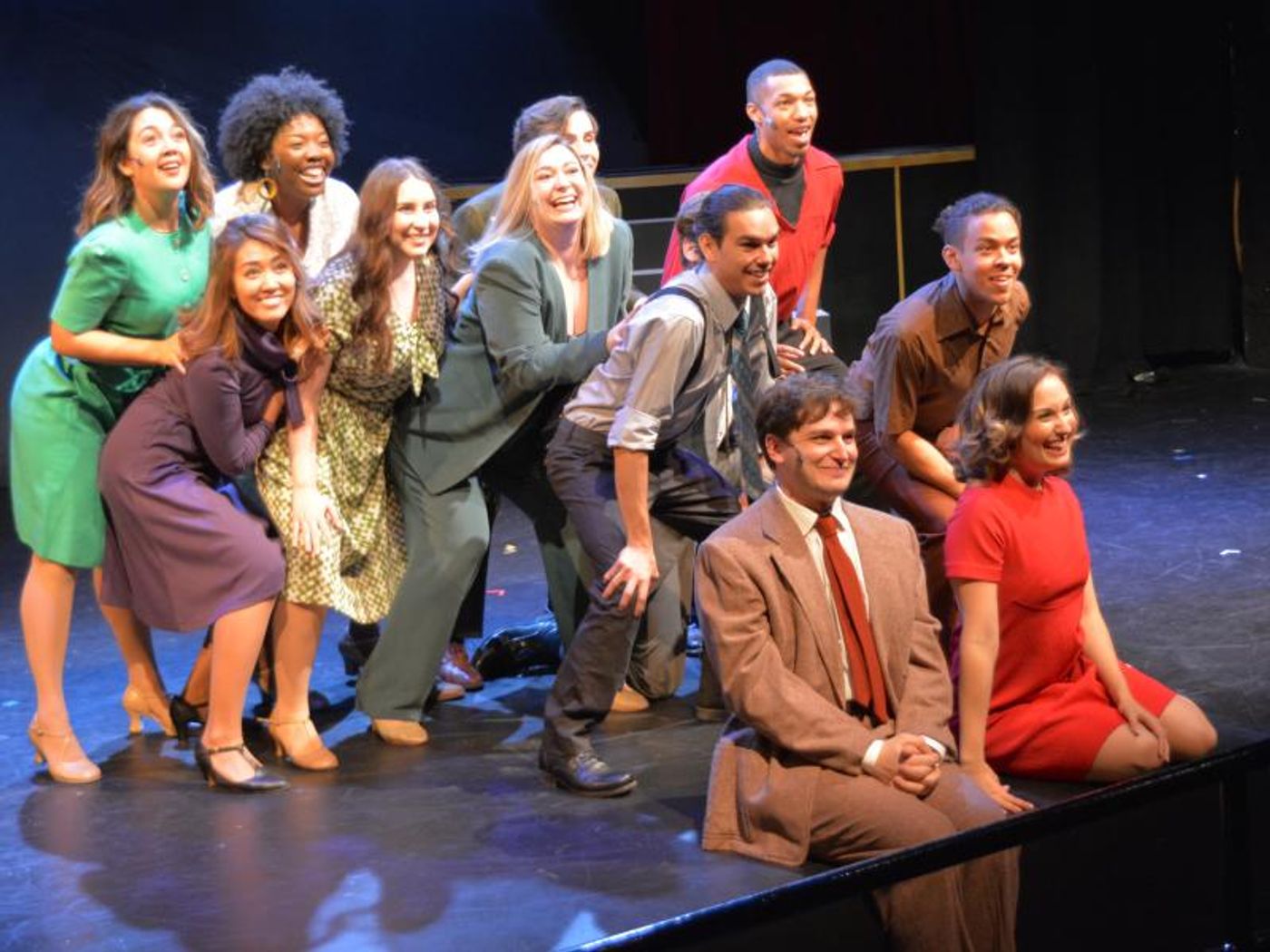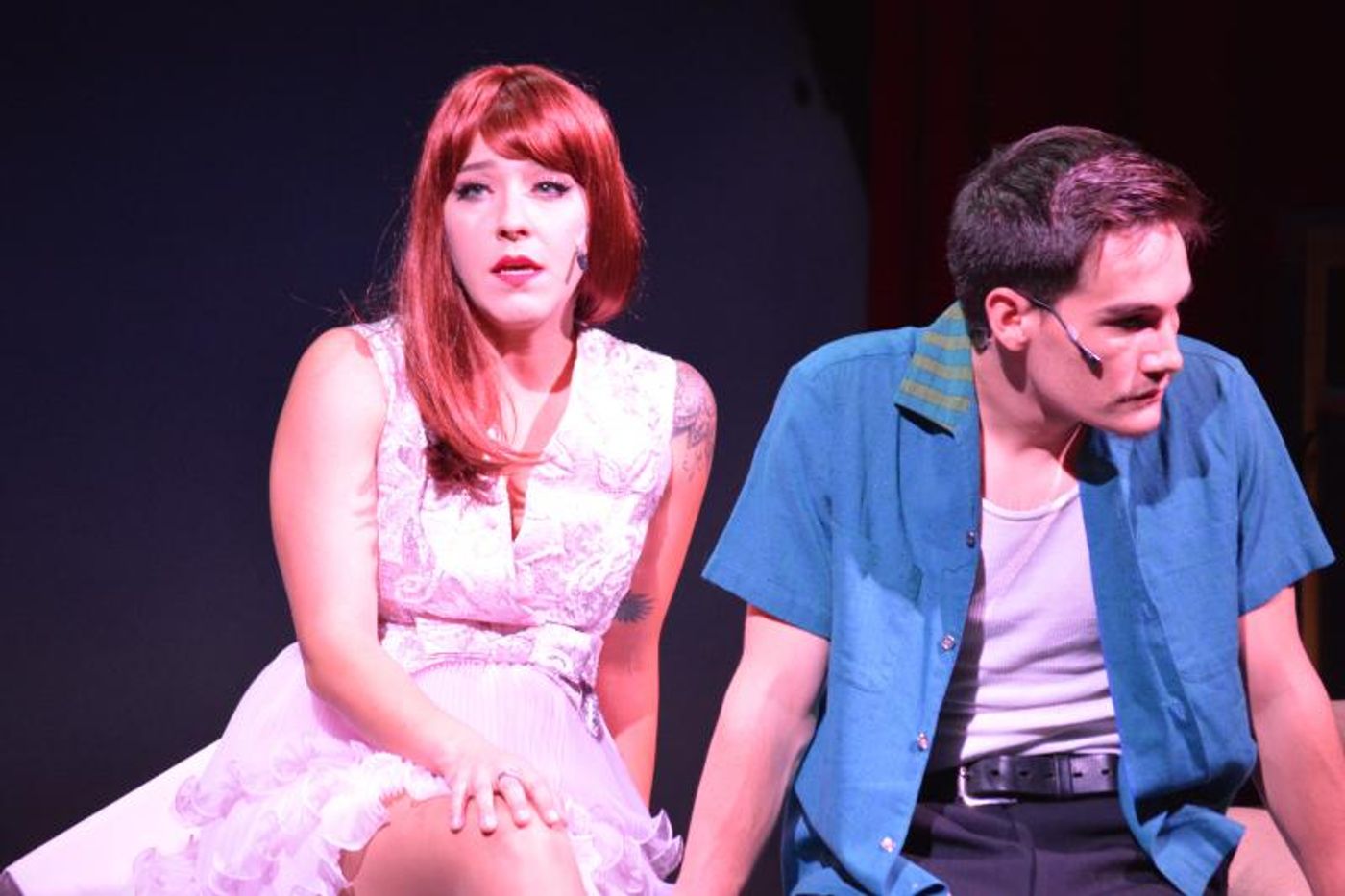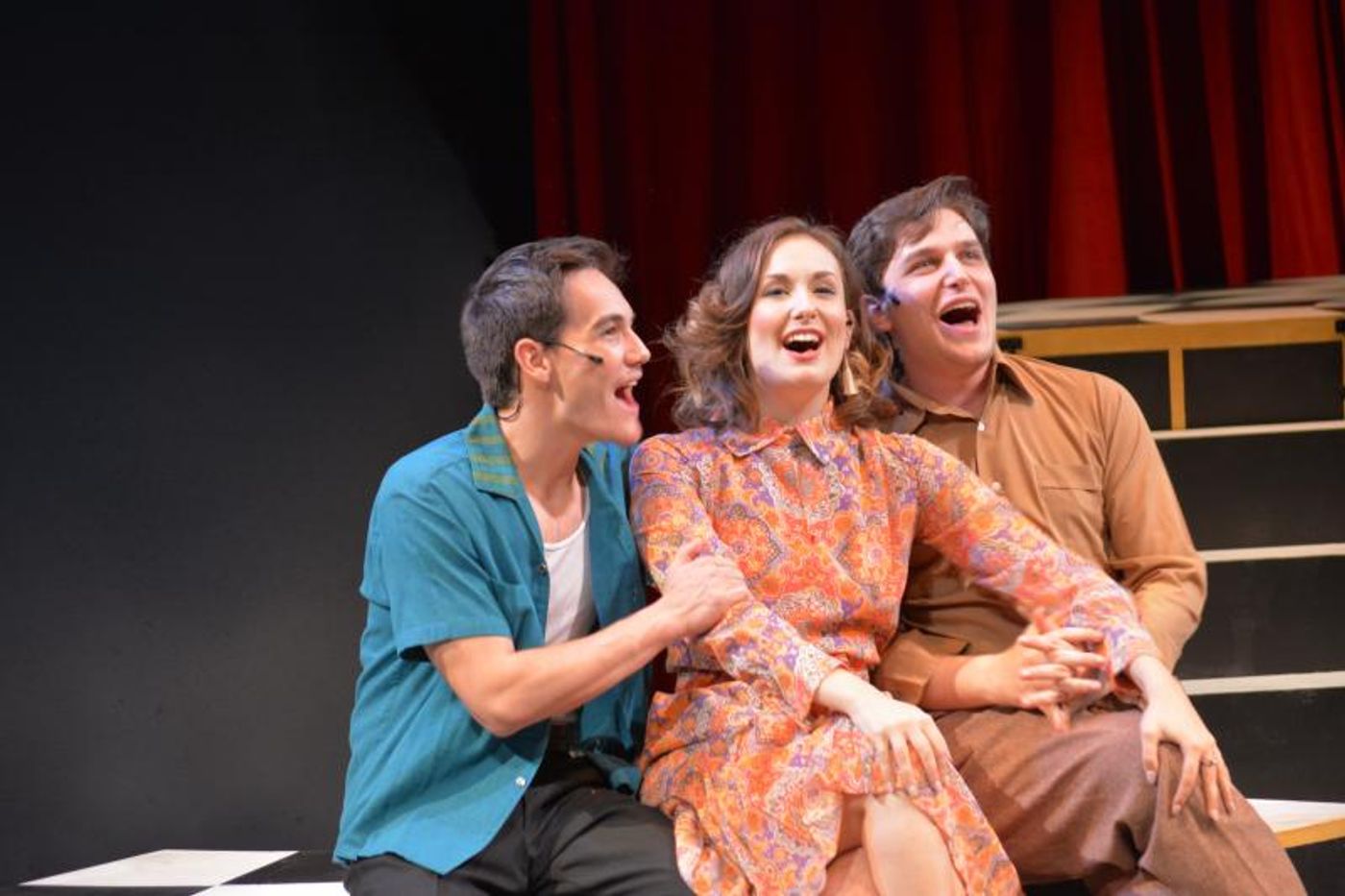Review: MERRILY WE ROLL ALONG - BACKWARDS, TO UNDERSTAND THE IRONY at The Colony Theatre

Presented by a brand new Production group, 4 Leaf Music Productions, in Association with Golden Performing Arts Center, and based on a 1934 Kaufman and Hart play of the same name, this musical tells the story of three friends, Franklin, Charley, and Mary, and the progressive decadence of their bonds and their dreams. The story is told in reverse. When it begins, in 1980, they're in their 40's: Franklin, is a rich, successful, conceited and confused noted songwriter; Charley, the lyricist in the duo, has cut off ties with his partner after a nervous breakdown and Mary is a lonely alcoholic still secretly in love with Franklin from when they first met, years and years ago. As we move forward in the play but backward in time, we see how their friendships disintegrate, along with their aspirations and Franklin's many whirlwind marriages. Rewinding through the '70s and '60s, we end up in 1957, when the three of them meet for the first time, on a rooftop in the city, as hopeful young talents per-chance gathering to watch Sputnik go by in the pre-dawn sky. The song they sing, "Our Time" ("We're the movers, we're the shapers/ the names in tomorrow's papers"), is undercut by some very keen irony, since we've already seen how it all turns out, at the beginning.
There is a sad realistic irony to this show as well. "Merrily We Roll Along" came at the end of a historic collaboration between Sondheim and the director Hal Prince, the team that redefined the Broadway musical with shows like "Company," "Follies," "A Little Night Music," and "Sweeney Todd and the unmatchable "West Side Story."" "Merrily We Roll Along," which takes place in the show-biz world of opening nights and brand-new hit songs, turned noses up on the creators' own milieu; Sondheim has said that an Act II number, "Opening Doors," is the only autobiographical song he has ever written. Frank Rich, in the Times, called the original musically-adapted production "a shambles." "Merrily" opened on Broadway on November 16, 1981, after a month of previews, and closed after just sixteen performances. Sondheim and Prince parted ways.
Do you wonder what happened to all those young upcoming actors who made their Broadway débuts in a new Sondheim show, only to see their dreams abruptly slashed? The story of "Merrily" is told in an informative documentary, "Best Worst Thing That Ever Could Have Happened." Drawing on long-lost footage from the original rehearsal room, the film doesn't focus so much on Sondheim and Prince - whom the young actors revered as "gods" - as on the cast members, who are now much older. The focus on actors is no surprise, because the documentary's director is Lonny Price, who played Charley in 1981. At the time, he was a young character actor who put up Sondheim posters in his bedroom as a kid and couldn't believe the break he had gotten. He has gone on to a successful career as a stage director, especially of Sondheim musicals.
In the film you learn how much the experience enhanced but also scarred the actors. Like Franklin, Charley, and Mary, some saw their show-business dreams go in unexpected directions, while others - in part because of the failure of "Merrily" - found new paths. Jim Walton, who played Franklin, has had intermittent roles on Broadway; Jason Alexander, who played Joe, the Broadway producer, became George Costanza (!) and is a seasoned Broadway star.
Watching the original cast members of the musical version reflect on the whole ordeal shows how devastating it was to realize they were on a sinking ship-and that their "gods," Sondheim and Prince, were mere mortals after all. "We watched our role models stumble," Abby Pogrebin, who was the youngest original cast member, says in the documentary (she's now an accomplished journalist), reflecting on what she learned as a sixteen-year-old in a legendary flop, she also articulates the show's thesis: "One of the lessons of adulthood is disappointment."
The documentary's finale is as heartrending as the show's is. With "Our Time" playing on the soundtrack, we see the moment in the audition room when Prince told the young cast they had all got the job. Screams and hugs follow; as in the show, we know how it all turned out.
In this current production, which closed August 26th, 2018, a handsome Trevor James Berger is excellent as Franklin Shepard, smoothly playing the complicated emotions that the character goes through, with a lot of charisma, I might add. His character has great intent which was felt, foremost, in Trevor's performance. Jeremy Ethan Harris, gives us a whole-hearted full-on performance as the slighted-but-affable sidekick and collaborator, Charley Kringas; Tori Grisham, is just delightful, as well as expertly revealing the many hidden emotions that her character Mary Flynn experiences throughout. Sarah Ryan, as Beth Spencer, really gives a heart-felt and poignant portrayal of the ex-wife, then wife (going backwards, that is) to Franklin. She is also an excellent singer, as are all the leads and ensemble. Renee Cohen,  as the mistress wanna-be, faux Broadway Star playing a role not herself her whole life, is appropriately over-the-top, annoying and ingratiating and desperately wanting fame and fortune. Brian Felker, as Joe Josephson, the Broadway Producer, is also well-rounded, playing his part with conviction, whether keeping his famous wife happy, or sealing in how we think a Broadway producer really behaves, to showing honest concern for the best outcome. Special mention for a fine, endearing performance, by Vince Venia, playing young Franklin Shepard, Jr., who himself emotes a wide range of emotions with excellence, with a bold stage presence and a solid singing voice.
as the mistress wanna-be, faux Broadway Star playing a role not herself her whole life, is appropriately over-the-top, annoying and ingratiating and desperately wanting fame and fortune. Brian Felker, as Joe Josephson, the Broadway Producer, is also well-rounded, playing his part with conviction, whether keeping his famous wife happy, or sealing in how we think a Broadway producer really behaves, to showing honest concern for the best outcome. Special mention for a fine, endearing performance, by Vince Venia, playing young Franklin Shepard, Jr., who himself emotes a wide range of emotions with excellence, with a bold stage presence and a solid singing voice.
The vocals are strong for the entire ensemble, and the staging kept things moving. I would suggest that the choreography be tweaked by a separate choreographer, who is not also the director, to make sure the cast members who dance are more skilled and rehearsed.
However, the Direction, by Sonny James Lira, was fast-paced and thoughtfully fresh and inventive. The sets were simple, useful and wonderful; designed to constantly adapt to each scene, and transferred from place to place, cleverly, by the cast and ensemble, usually when there was a scene diverting attention somewhere else on stage; credited in the program as Builder, Red Colegrove, with designs by Effy Yang. I especially liked the Lighting Design touches by Zachary Titterington, with subtle hints like the flashes of clocks (which were ticking backwards) on the upstage scrim, as well as representations of the city they were in in each scene, and other symbolic references. The live orchestra was a definite treat, with the very able Jan Roper at the helm, also playing the rehearsal pianist on stage during a scene where the composer/lyricist duo was auditioning. The costumes were also right on target, executed by Michael Mullen, with the different eras portrayed, with lots of eye-catching glitter and glam for the Gussie Carnegie role (Renee Cohen).
 The score is vintage Sondheim in every way. The complexity of his musical arrangements and lyrics is on prominent display. The orchestra playing live, up above stage left, really enhanced the impact of the words and melodies. Excellent.
The score is vintage Sondheim in every way. The complexity of his musical arrangements and lyrics is on prominent display. The orchestra playing live, up above stage left, really enhanced the impact of the words and melodies. Excellent.
The original production of the musical was Directed on Broadway by Harold Prince, Music and Lyrics by Stephen Sondheim, Book by George Furth, Choreography by Larry Fuller and produced by Lord Grade, Martin Starger, Robert Fryer and Harold Prince in Association with Ruth Mitchell and Howard Haines.
Yes, dreams will fade, friendships change and decay, and adults can be so insincere and hypocritical. But this show gives us the chance to rewind the clock and check back in with the person you once used to be, if only to remind yourself of the reason you chose this journey in the first place, and to go forward with that in mind.
Photos courtesy of 4 Leaf Music Productions
Reader Reviews
Videos

